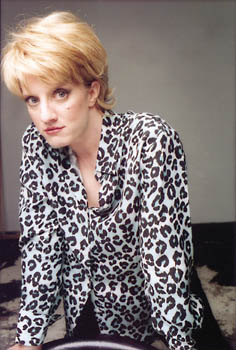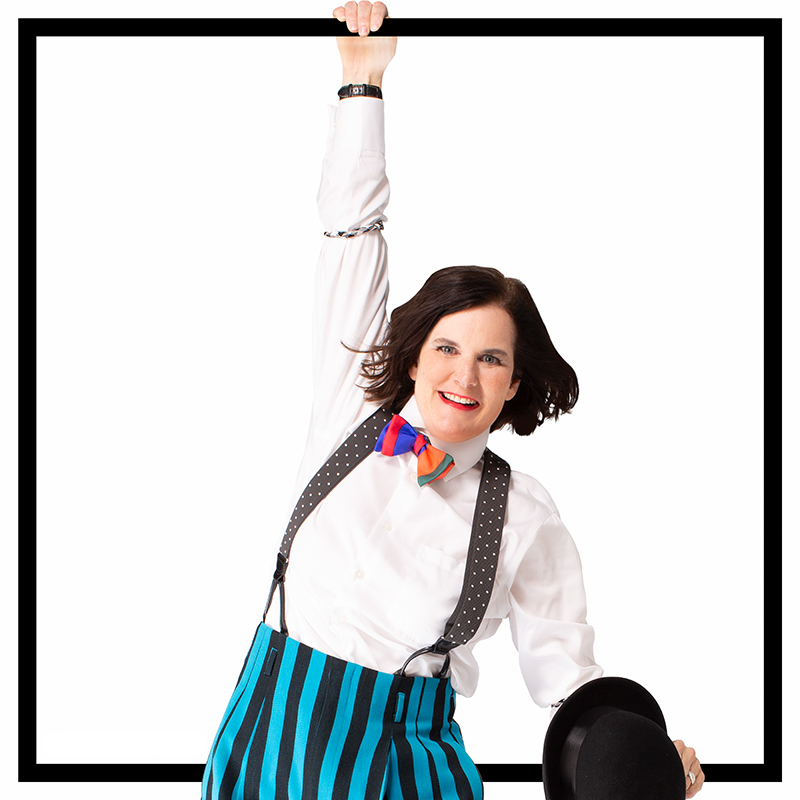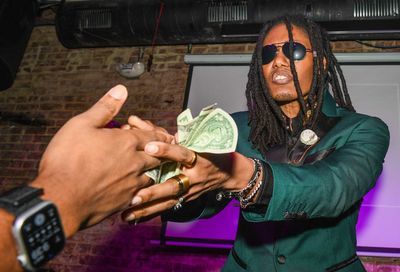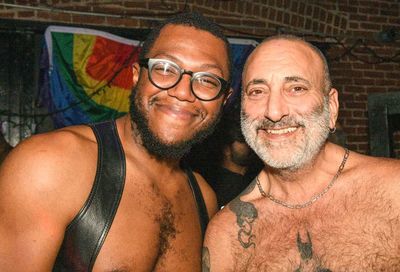Funny Girl
Interview with comic Suzanne Westenhoefer, emcee of Mautner Project's Gala
“Next to ‘Why do you always serve chicken?’ and ‘Can I have a table as far away from my ex-lover as possible?’ the most-asked Gala question we get is ‘When are you having Suzanne Westenhoefer again?'” says Kathleen DeBold, Executive Director of the Mautner Project.
The answer, of course, is this Saturday, September 21, as the noted comic emcees the organization’s annual fall gala at the Washington Hilton.
It’s been quite a ride for the small-town Pennsylvania-born comic, who began her comedy career on a dare. As a bartender, her regulars would constantly prod her: “You’re so funny, you should do standup.” And when she finally took the stage in a New York club in 1990 during an amateur contest, her entire life turned around. She not only beat out twenty other comics for first place. But a comedian — an exceptionally funny comedian — was born.
 |
“I make a great living doing what I want to do,” says the 42-year-old Westenhoefer from her home in Los Angeles (she also maintains a home in Ohio, with her longtime girlfriend, a schoolteacher). “Because I grew up in an area where almost everybody worked in a factory, I know how hard it is to be able to make a good living. And doing something you don’t hate is not a guaranteed right, man. I have had great fortune. The only thing that could be better, I guess, is if I were to have been a stripper. But I don’t have the body for it anymore.”
An avid activist and an extremely left-leaning liberal, Westenhoefer is eager to note one bizarre coincidence that occurred over the course of her career.
“I was on the Sally Jesse Raphael show in January, 1991. It was the 21st of January when it aired. The next day we went to war with Saddam Hussein under President George Bush. Last March, I was on David Letterman. And the next day we went to war with Saddam Hussein, under another Bush. My two biggest television moments and we went to war with Iraq immediately afterwards. My mom said to me, ‘You have to stay off the talk shows. Nothing good can come of it.'”
Plenty good, however, comes of sitting and listening to Westenhoefer share her thoughts about the Mautner Project, quitting smoking, gay activism and Ellen, and the woman she most wanted to become: Susan Hayward.
METRO WEEKLY: So how are you? How is life?
SUZANNE WESTENHOEFER: Life is good. Life is amazing. I’m busy, I’m crazy. I’m running two households and I’m traveling all the time. A lot going on, babe, a lot going on. Touring as always. That’s what I do. Seventy, eighty cities a year. One night, in and out, it’s crazy. I just taped a one-hour special for Bravo.
MW: It’s become the gay network.
SUZANNE: Yeah, I know. What happened there? It’s because NBC owns them and they’re having such success with Will & Grace that they’re starting to realize that “Oh, as a matter of fact there is a whole group of us out there that wants gay television.”
MW: How did the special go?
SUZANNE: Great.
MW: You did your current act, I imagine.
SUZANNE: I don’t have a current act. You know what I am? I’m extemporaneous. How much do you like that word? I learned it when I was in speech class. I am extemporaneous. I know where I want to go, I’ve got a lot of topics I want to hit, I have some stuff that’s really very specific to the way I want to say it, but a lot of times it comes off the top of my head, reworking something I said a week ago, adjusting something from two years ago that I said once. It’s not very structured.
MW: You clearly had a gift for this when you were young.
SUZANNE: I had a gift for being chatty. That’s what my mom says. She says “You get paid now for what you used to have to move your desk into the hall for. Talkin’ all the time, trying to be funny and cursing.” She thinks it’s hysterical because she never thought I was a bad kid, but I was a little bit of a verbal handful. I wasn’t breaking stuff, or wrestling kids to the ground. I was just constantly talking.
MW: What was your childhood like?
SUZANNE: The way I remember it is that there were a ton of kids to play with because we lived in was a Catholic neighborhood. We were Lutheran. And so it was highly stimulating. There was always stuff to do. There were row homes, and every home had ten kids in it. There was just always somebody doing something, playing something, getting into trouble.
MW: When did you leave?
SUZANNE: When I was 18. I went to college in northwestern Pennsylvania. A small state school. We didn’t have a tremendous amount of money and so I had to go wherever I could use my grants. I got a Bachelor of Fine Arts in acting. I thought I was going to be Susan Hayward.
MW: It’s funny to hear you say Susan Hayward.
SUZANNE: Yeah, I know, because we’re so much alike.
MW: No, because who thinks of Susan Hayward anymore?
SUZANNE: I had an aunt who I worshipped, and both she and my mother and my grandmother — the three major women in my life — were movie fans. So I’m like four years old, I’m watching Humphrey Bogart, I’m watching Susan Hayward. So I do have a movie knowledge of someone who’s fifty-five. Loved the movies. Loved Greer Garson. Elizabeth Taylor. Julie Andrews — I know Julie Andrews wasn’t the greatest actress, but something about her was so enchanting. Plus she sang. And when you’re a little girl, that’s just so romantic and sweet. But Susan Hayward was special. She was a bit of an underdog, and tended to play someone who might die before the film was over. That was the real draw to me.
MW: Sounds like a pretty heavy crush.
SUZANNE: Oh, totally. And Barbara Stanwyck. Oh, my god, I was so crushed on Barbara Stanwyck. That was the period of time in the mid-seventies when they were rerunning Big Valley all the time. And I would watch it two, three times a day. Did I like westerns? No, I did not. Did I care? No, I did not. She was wearing culottes and a little leather jacket. Oh, please. But you’re eight, nine years old, you think a girl is cool. Girls emulate each other and have crushes on each other and it has nothing to do with anything. It doesn’t mean they’ll be gay. So you can’t use it as — “Oh, it’s because I was gay” or anything. You don’t know yet.
Boys admire other boys — they want to be like them, they have heroes and stuff. But it’s very specific. You know, like, a twelve-year-old boy who has a best friend he thinks is totally fabulous is never going to crawl into bed with him. It’s not going to happen. But it will happen for girls. Even in college it will. And it still won’t mean anything. With boys, physicality means something.
Ask girls if they ever practiced kissing with another girl when they were young and you’ll [find that most] have done it. Now, ask a guy. There’s never been a guy who practiced kissing with another guy. If he did, he’s a drag queen now. And any girl I practiced kissing with is married and has two kids.
MW: What do you think your life would have been like had you been straight?
 |
SUZANNE: Well I used to think — and this is the Susan Hayward in me — that when I grew up I was just going to have a series of gorgeous young lovers as I went through my career. When they got just a little too serious, I would have to toss them aside, say “No, no, no!”
MW: Seriously, could you imagine yourself as a housewife with two kids?
SUZANNE: I never did. And I’m very, very much a homemaker. But I never ever thought about being a housewife or having children, ever. Probably because my mom thought she would never be anything but a housewife and a mother and that’s all she ever wanted to do. So she got married and had three children and created a household and my father found someone else. Boom. Gone. She has a two year old, a four year old, a six year old, no skills, no money and her life, especially in her twenties, thirties and forties was so hard. So fuckin’ hard. And I think there was no romance for me in that choice.
MW: Speaking of choice, I understand you quit smoking a few years ago. Talk about that.
SUZANNE: I remember being at a Mautner event and still being a smoker. And let me just tell you how horrifying that is! I’m not going to say it was the exact reason I quit, but it sure as hell helps things along to have a thousand women staring at you like you’re a leper.
MW: How’s that going? Do you miss it?
SUZANNE: No. I’m fortunate enough to live the majority of time in Los Angeles where it’s illegal everywhere. You just sort of make these choices.
MW: This will be the second gala you’ve emceed for Mautner, and you’ve appeared at several smaller events for the organization. Clearly it means something to you.
SUZANNE: It does. If I were sick, I would want to know that Mautner was around. And if you don’t do the work, then it won’t be. And since I can get as sick as anybody else I want to know it’s there if I get sick. Now, how can I make that happen? Support it. I feel that lesbian health gets swept under the carpet a lot. Medical studies get done and they don’t include lesbians. Lesbians have generally different health needs. There’s a lot of studies that talk about how we get more breast cancer because we don’t get pregnant. Nobody really knows if that’s true, but who’s gonna be checking up on that stuff if it’s not Mautner? So it’s one of those things that you want to know that there’s somebody out there doing the work. I can’t do the work. All I can do is be the celebrity. All I can do is write a check. But I intend to do that, because it matters.
Also, I’ll tell you another thing: I love Kathleen DeBold so much. I admire her. She could probably be running almost any organization and I would certainly look into it, just because it was her. She has that kind of personality to me. She’s a worker, she’s an activist, she’s a believer. From the first time I met her, I felt she totally gets this shit. She is so in this with her heart. And that is always very exciting, to be around someone that you know is totally in it like that. And she’s that way and it’s always been — that’s also a big draw for me. I’m just a real fan.
MW: Though it’s grown over the years, Mautner still has a hard time acquiring mainstream support from other larger cancer organizations.
SUZANNE: First of all, lesbians are going to have to do it for themselves. I’m not the kind of person who asks “Why aren’t we getting that when someone else is?” I’m the “Okay, fuck them, we have to find another thing.” What gets me upset is when you go to lesbians and they don’t write the check or they don’t come to the Mautner Gala. Here’s the deal: Mainstream isn’t going to take care of us. We may have to take care of ourselves. You gotta put money, put time, put effort where it is. We can’t depend on mainstream America to take care of us. Fuck the national organizations if they don’t give us money. We’ll keep bugging them. And in the meantime, we’ll go to our own people and we’ll raise that money. It’s a little harder, but we can and we will.
MW: What about the lesbians who just simply blow it off?
SUZANNE: Them I don’t have time for. You have to be an activist. I don’t care what your point is, I don’t care what your thing is, but if you’re on this earth and you’re using up product, then you have to give back. And if you don’t have money, then you show up and you answer the phone. Anybody who is not an activist in some way is wasting space, man. You have to be doing something, whatever it is. But you can’t support every cause, though. Find what’s important to you and then put something out.
MW: You’ve been an out gay comic since the beginning. How do you feel about Ellen and Rosie, who achieved their success while in the closet and then came out.
SUZANNE: I think they did what they thought was appropriate for their lives. And regardless of any good or bad that comes out of it, the most important thing is that it’s better to be out. And I also think that they did a really important thing. Is it hard to see two women get all the attention as if there aren’t a pack of us out there that have been busting our chops as openly gay comics? Sure. But hey, it’s Hollywood.
MW: But do you sometimes wonder “If I hadn’t been out from the start, I might have been in a different place now?”
SUZANNE: I know that that’s probably true, but that’s not my point in being here, so I don’t care. I might have gotten more acting work, gotten on television, maybe even had my own show, whatever. But I didn’t get into it for the success part. I got into it for the activist part. But do I want my own show? Yes. Do I want huge success? Yes. That’s what I’m working for, absolutely. But it has to be on my terms. That sounds so obnoxious, but I don’t mean it that way. What I mean is that was the point. The point was to be open.
And I have to tell you I’ve been very fortunate. My career’s been very fortunate. I did not have to pay my dues, traveling around in Super 8 motels opening for homophobic comics. I did not have to do any of that. I was a headliner and had my own show within a year and a half. It was just boom.
MW: Well, with gays now being such hot entertainment commodities, you can certainly use that to your continued advantage.
SUZANNE: Gay guys are hot. Lesbians are not hot. Let’s see how The L-Word goes on Showtime. There’s really nothing happening for lesbians. All the things that are coming up on television are gay guys. And I actually think gay men are more acceptable in popular culture than lesbians because of the sarcastic wit. Lesbians are scary. We’re still viewed as ice-pick killers. I think there’s a lot less of that, but if you think about it, there’s nothing lesbian on television right now.
MW: Ellen’s got a show.
SUZANNE: Yeah. And has she said one thing? There’s nothing lesbian abut it. We all know now, but it’s not mentioned, it’s not inferred. I think she talked about her new puppy but I didn’t hear her say a word about Alexandra, her girlfriend. And you know if they have a new puppy at home that both of them are not sleeping. “You get up and walk her! It’s YOUR turn!” But I don’t hear her mentioning it. It’s as if she lives alone.
MW: What do you think made Ellen back off?
SUZANNE: Just because you’re queer doesn’t make you an activist. You can’t make her do stuff. And why would you want to force someone to be an activist? When there are people who are willing, who want to? That would be what I would want representing me or speaking at my function. Somebody who really wants to do it. Ellen is not comfortable in the activist spotlight — I don’t think she ever was. It’s not her style. She doesn’t want to be a spokesperson for gay people. So gay people should just leave her be. I want to be, Kate Clinton wants to be, Martina’s fabulous at it. Some of us are just more comfortable in activist roles than others. There’s enough people who want to be heroes, who want to speak for the gay community. Support them.
It’s funny because people will say, “Do you mind speaking for the gay community?” and I would be honored to speak for the gay community. As a matter of fact, I have always felt a great responsibility about that. But it’s not even given to me. So there you go.
The Mautner Project Gala will be held this Saturday, September 20, at the Washington Hilton. For more information on the gala or The Mautner Project’s services, call 202-332-5536 or visit www.mautnerproject.org.
Support Metro Weekly’s Journalism
These are challenging times for news organizations. And yet it’s crucial we stay active and provide vital resources and information to both our local readers and the world. So won’t you please take a moment and consider supporting Metro Weekly with a membership? For as little as $5 a month, you can help ensure Metro Weekly magazine and MetroWeekly.com remain free, viable resources as we provide the best, most diverse, culturally-resonant LGBTQ coverage in both the D.C. region and around the world. Memberships come with exclusive perks and discounts, your own personal digital delivery of each week’s magazine (and an archive), access to our Member's Lounge when it launches this fall, and exclusive members-only items like Metro Weekly Membership Mugs and Tote Bags! Check out all our membership levels here and please join us today!























